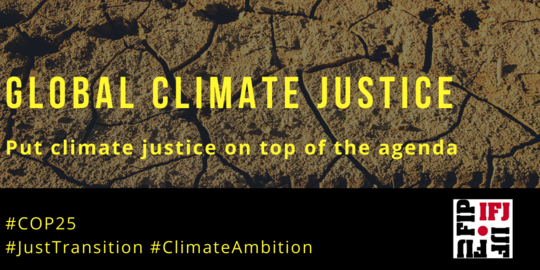The Executive Committee of the International Federation of Journalists (IFJ), meeting on November 26-27 in Tangiers (Morocco) express the urgency of media and journalists to be more involved in the world’s debate about climate crisis.
The IFJ has stricken a committee to deal with the crisis on the eve of the United Nations Climate Change Conference from Dec. 2 to 13 in Madrid, Spain.
The committee will consider actions the IFJ will take to support the global movement for climate action, establish necessary alliances to (work with NGOs), address our own practices and involve all affiliates to promote a just transition and climate justice for all, as well as ethical journalism to cover the crisis.
Climate scientists have given the world 10 years to stabilize the planet with a maximum 1.5-degree temperature rise. The IFJ has already joined several actions lead by the Global Unions pushing for government action.
We call on the world’s journalists to tell the truth on climate change and to act accordingly, applying best practices to improve coverage on the most pressing problem of our time.
Biased disinformation on climate change has led to decades of inaction to the point of crisis, threatening the existence of life on Earth. Scientists are warning that we may have already crossed irrevocable tipping points.
Journalists have a special responsibility to promote facts on climate change and associated impacts.
Tangiers, Morocco, 28th November 2019

